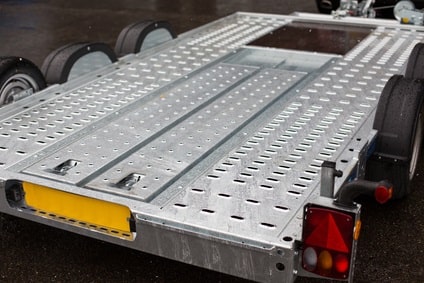Aluminum vs Steel: Which Material is Better for Building Trailers


When it comes to trailer manufacturing, one of the most important things to consider is material, particularly the type of metal from which the container is fashioned. If you simply dip a toe into the subject, you’ll see that there are really only two viable options when it comes to selecting material – it’s either aluminum or steel.
What’s particularly interesting about this choice is that both materials do the job; when engineered effectively, both aluminum and steel provide excellent protection and storage for moving inventory. But, with that said, one of these materials offers a bit more flexibility than the other. 
Before we give you that answer, though, it’s important to take a look at several factors that could affect your overall design and/or purchasing process. To do this, you must first consider these key performance features:
Ostensibly, the first thing that buyers will consider when shopping for a trailer is the price. Typically, trailers that are fashioned out of aluminum are more expensive than steel. As a matter of fact, you’d be hard-pressed to find two comparable trailers, one being aluminum, and one being steel, that don’t exhibit a major difference in price.
That said, there are certain long-term costs required for the proper upkeep of steel trailers that could offset the price tag. But, we’ll get to those later…
Winner: Steel
Like any vehicle accessory, trailers require maintenance. Naturally, one of the most common things that happen to metal trailers, especially when they’ve clocked a few thousand miles in the elements, is corrosion. Normal steel tends to rust quickly, so much so that many trailer manufacturers whose clients are based in cold climates tend to steer them to aluminum.
Of course, not all steel is prone to rust; stainless steel contains rust-resistant properties, but the material is usually much too heavy and expensive to be used for trailers. Aluminum can also rust, but most owners find that the metal holds up well with the odd acid shower.
Winner: Aluminum
Now to the answer of the most important question: which material is more aerodynamic – aluminum or steel? Luckily, this is a category in which the answer is a simple one. Aluminum trailers are, on average, roughly 10-15% lighter than their steel counterparts.
This lightness spells much better performance for the operating company. Not only does it mean that aluminum trailers have a higher payload capacity, but it also means better gas mileage, too. Additionally, it can give the entire rig a lower GVWR, something that can be a huge advantage for those hauling especially large loads.
Winner: Aluminum
One thing that most people forget when it comes to this subject is that many aluminum trailers actually have steel components that are integrated into the design in order to shore up any compromised areas. This obviously means that steel is a more rugged material than aluminum.
But, just because steel is more inherently durable doesn’t mean that aluminum should be overlooked. As a matter of fact, when aluminum is supported by steel implements, like the designs that are seen in trailers, the material actually carries a better strength-to-weight ratio.
Winner: Tie. Both materials are quite strong, but aluminum is always a lighter choice.
Looking back at the ‘Maintenance’ section of this article, you’ll remember that aluminum trailers require much less maintenance than steel trailers. This is because trailer-owners, particularly ones who operate in rough climates, must always fight an uphill battle against rust.
For this reason, aluminum tends to outlast steel.
Winner: Aluminum

Another important factor that buyers look for when purchasing a trailer is the overall resale potential of the product. Again, the thing that continues to hurt steel, besides its heaviness, is its rust issue. According to Featherlite Trailers, typical steel trailers tend to suffer patches of rust after just a couple of years of use. This rust can often be hard to repair, which can affect the resale of the trailer greatly.
Luckily, aluminum trailers tend to look like new after an acid bath and often come with better warranties, too.
Winner: Aluminum
Eco-conscious buyers would be happy to know that there is a well-defined, green choice when it comes to trailer manufacturing. According to the Aluminum Association, aluminum beats out steel in the greenhouse gas department by a staggering 90 pounds.
Winner: Aluminum
As you can see, the clear, all-around winner here is aluminum. Of course, it’s the choice of the customer to select the material that will pair up best with their needs, but when it comes to sustainability, longevity, weight, maintenance, and resale potential, aluminum has steel beat.
When it comes to data plates and rating plates, these same considerations play a role. After all, a vehicle’s data plates are exposed to the same environments that the trailers are, and it’s imperative that rating plates and data plates remain readable. MPC offers both stainless steel data plates and rating plates constructed of durable Metalphoto® photosensitive anodized aluminum, allowing customers to select the materials best-suited for each application.
Our sales engineers are experts in automatic asset tracking, tagging and identification,a nd can answer all your questions. Get in touch now.
Lets Talk ›